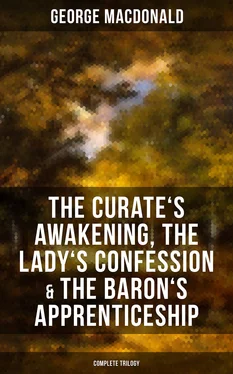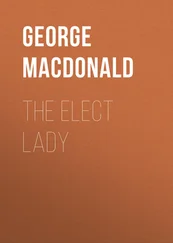"'And as I stood and watched, suddenly it came into my mind that I had never yet seen the coin of the country, and thereupon I kept my eyes upon a certain woman who bought silk, that when she paid for the same I might see the money. But that which she had largely bought she took in her arms and carried away, and paid not. Therefore I turned to watch another, who bought for a long journey, but when he carried away that he bought, neither did he pay any money. And I said to myself, These are well-known persons, to whom it is more convenient to pay all at a certain season; and I turned to a third who bought much fine linen. But behold! he paid not. Then I began to observe again those that sold; whereupon I thought with myself, How good must be the air of this land for the remembrance of things! for these men write down nothing to keep on record the moneys men owe them on all sides. And I looked and looked again and yet again, and stood long watching—but so it was throughout the whole place, which thronged and buzzed and swarmed like the busiest of bee-hives—no man paid, and no man had a book wherein to write that which the other owed!
"'Then I turned to my guide and said: How lovely is honesty! and truly from what a labour it absolveth men! for here I see every man keepeth in his mind his own debts, and not the debts of others, so that time is not spent in paying of small sums, neither in the keeping of account of such; but he that buyeth counteth up, and doubtless when the day of reckoning arrives, each cometh and casteth the money he oweth into the merchant's coffer, and both are satisfied.
"'Then my conductor smiled, and said, Watch yet a while.
"'And I did as he said unto me, and stood and watched. But the same thing went on everywhere; and I said to myself, Lo, I see nothing new!—Suddenly, at my side, a man dropped upon his knees, and bowed his head to the ground. And those that stood nigh him dropped also upon their knees, and there arose a sound as of soft thunder; and lo! everyone in the place had dropped upon his knees, and spread his hands out before him. Every voice and every noise was hushed, every movement had ceased, and I and my guide alone were left standing.
"'Then I whispered in his ear, It is the hour of prayer: shall we not kneel also? And my guide answered, No man in this city kneeleth because others do, and no man is judged if he kneeleth not. If thou hast any grief or pain upon thee, then kneel; if not, then love God in thy heart and be thankful, and kneel when thou goest into thy chamber. Then said I, I will not kneel, but will watch and see.—It is well, said my guide; and I stood.
"'For certain moments all was utter stillness—every man and woman kneeling, with hands outstretched, save him who had first kneeled, and his hands hung by his sides and his head was still bowed to the earth. At length he rose up, and lo! his face was wet with tears; and all the people rose also, and with a noise throughout the place; and the man made a low obeisance to them that were nigh him, the which they returned with equal reverence, and then with downcast eyes he walked slowly from the shop. The moment he was gone, the business of the place, without a word of remark on any side concerning what had passed, began again and went on as before. People came and went, some more eager and outward, some more staid and inward, but all contented and cheerful. At length a bell somewhere rang sweet and shrill, and after that no one entered the place, and what was in progress began to be led to a decorous conclusion. In three or four minutes the floor was empty, and the people also of the shop had gone, each about his own affairs, without shutting door or window.
"'I went out last with my guide, and we seated ourselves under a tree of the willow-kind on the bank of one of the quieter streams, and straightway I began to question him. Tell me, sir, I said, the purport of what I have seen, for not yet have I understood how these happy people do their business and pass from hand to hand not a single coin I And he answered, Where greed and ambition and self-love rule, money must be: where there is neither greed nor ambition nor self-love, money is needless. And I asked, Is it then by the same ancient mode of barter that they go about their affairs? Truly I saw no exchange of any sort.—Bethink thee, said my guide, if thou hadst gone into any other shop throughout the whole city, thou wouldst have seen the same thing. I see not how that should make the matter plainer to me, I answered.—Where neither greed nor ambition nor selfishness reigneth, said my guide, there need and desire have free scope, for they work no evil.—But even now I understand you not, sir, I said.—Hear me then, answered my guide, for I will speak to thee more plainly. Wherefore do men take money in their hands when they go where things are?—Because they may not have the things without giving the money.—And where they may have things without giving money, there they take no money in their hands?—Truly no, sir, if there be such a place.—Then such a place is this, and so is it here.—But how can men give of their goods and receive nought in return?—By receiving everything in return. Tell me, said my guide, why do men take money for their goods?—That they may have wherewithal to go and buy other things which they need for themselves.—But if they also may go to this place or that place where the things are the which they need, and receive of those things without money and without price, is there then good cause why they should take money in their hands?—Truly no, I answered; and I begin, methinks, to see how the affair goeth. Yet are there some things still whereupon I would gladly be resolved. And first of all, how cometh it that men are moved to provide these and those goods for the supply of the wants of their neighbours, when they are drawn thereto by no want in themselves, and no advantage to themselves?—Thou reasonest, said my guide, as one of thine own degree, who to the eyes of the full-born ever look like chrysalids, closed round in a web of their own weaving; and who shall blame thee until thou thyself shinest within thyself? Understand that it is never advantage to himself that moveth a man in this kingdom to undertake this or that. The thing that alone advantageth a man here is the thing which he doth without thought unto that advantage. To your world, this world goeth by contraries. The man here that doeth most service, that aideth others the most to the obtaining of their honest desires, is the man who standeth highest with the Lord of the place, and his reward and honour is, to be enabled to the spending of himself yet more for the good of his fellows. There goeth a rumour amongst us even now that one shall ere long be ripe for the carrying of a message from the King to the spirits that are in prison. Thinkest thou it is a less potent stirring up of thought and energy to desire and seek and find the things that will please the eye, and cheer the brain, and gladden the heart of the people of this great city, so that when one prayeth, 'Give me, friend, of thy loaves,' a man may answer, 'Take of them, friend, as many as thou needest'—is that, I say, an incentive to diligence less potent than the desire to hoard or to excel? Is it not to share the bliss of God who hoardeth nothing, but ever giveth liberally? The joy of a man here is to enable another to lay hold upon that which is of his own kind and be glad and grow thereby—doctrine strange and unbelievable to the man in whom the well of life is yet sealed. Never have they been many at a time in the old world who could thus enter into the joy of their Lord. And yet, if thou bethink thee, thou wilt perceive that such bliss is not unknown amongst thy fellows. Knowest thou no musician who would find it joy enough for a night, to scale the tower of a hundred bells, and send the great meteors of music-light flying over the care-tortured city? Would everyone even of thy half-created race reason with himself and say: Truly it is in the night, and no one can see who it is that ministereth; the sounds alone will go forth nor bear my image; I shall reap no honour; I will not rise and go? Thou knowest, I say, some in thy world who would not speak thus in their hearts, but would willingly consent to be as nothing, so to give life to their fellows. In this city so is it with all—in shop or workshop, in study or theatre, all seek to spend and be spent for the lovely all.—And I said, One thing tell me, sir—how much a man may have for the asking.—What he will—that is, what he can well use.—Who then shall be the judge thereof?—Who but the man himself?—What if he should turn to greed, and begin to hoard and spare?—Sawest thou not the man this day because of whom all business ceased for a time?—to that man had come a thought of accumulation instead of growth, and he dropped upon his knees in shame and terror. And thou sawest how all business ceased, and straightway that of the shop was made what below they call a church; for everyone hastened to the poor man's help, the air was filled with praying breath, and the atmosphere of God-loving souls was around him; the foul thought fled, and the man went forth glad and humble, and to-morrow he will return for that which he needeth. If thou shouldst be present then, thou wilt see him more tenderly ministered unto than all the rest.—And if such a man prayed not?—If such a man slept ere he repented, he would wake with hatred in his heart towards the city and everyone therein, and would straightway flee into the wilderness. And the angel of the Lord would go out after him, and smite him with a word, and he would vanish from amongst us, and his life would be the life of one of those least of living things that are in your world born of the water; and there must he grow up again, crawling through the channels of thousand-folded difference, from animal to animal, until at length a human brain be given him, and after generations he become once again capable of being born of the spirit into the kingdom of liberty. Then shall all his past life open upon him, and in shame and dismay will he repent a thousand-fold, and will sin no more. Such, at least, are thoughts of our wise men upon the matter; but truly we know not.—It is good, I said. But how are men guided as to what lies to them to provide for the general good?—Every man doeth what thing he can, and the more his labour is desired, the more he rejoices.—If a man should desire that he could no where find in the city?—Then would he straightway do his endeavour to provide that thing for all in the city who might after him desire the same.—Now, sir, methinks I know and understand, I answered. And we rose and went farther.'"
Читать дальше












